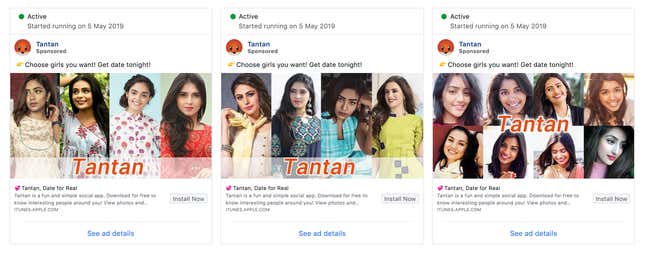American dating apps may be making a splash in India, but a Chinese brand working mostly under the radar is close at their heels.
China’s favourite dating app is now the fifth-most popular in India by combined monthly active users on iOS and Android phones, according to the analytics firm App Annie.
In May 2018, Tantan did not feature among the top 10, but zoomed to the fourth position by July. It has since slid one spot following the launch of US-based Bumble in December, data from App Annie shows.
Pronounced tan-tan as in “sun tan,” Tantan translates in Mandarin to “talk.” Launched in 2014, the app bears a high resemblance to the US’s Tinder, and was acquired by the Chinese social network Momo in February 2018. Tantan has over 90 million registered users in China.
The Indian dream
“India is one of the fastest growing internet markets in the world, hence it’s very important to be present and win in the Indian market,” Tantan said in an email to Quartz. “After doing a soft launch in India, we learned more about the market and users which helped us in serving the market better.”
Tantan is not alone. India has been flooded with Chinese apps over the past few months, some of which such as video-sharing app TikTok and e-commerce platform Club Factory have been growing rapidly.
Experts say there’s a reason India is a priority market for these Chinese apps. “Once they mature in China, India is the only place these apps can go to. Chinese apps have very low acceptance in the West,” said Yugal Joshi, vice-president at Everest Group consultancy.
However, their run in India has been far from smooth.
With over 300 million Indian users, TikTok has been a raging success in the country. Yet, in April, an Indian court temporarily banned the app on the grounds that it exposes children to obscene content and predators. Google and Apple’s app stores pulled down TikTok for two days, which resulted in a loss of around $1 million, according to its parent company ByteDance.
While Tantan so far hasn’t faced such troubles in India, it has received flak back home in China, where it was banned last month. Though the reason for the ban is unclear, it is said to be a part of the Chinese government’s ongoing crackdown on online obscenity.
New marketing
Tantan has managed to rise through India’s crowded online dating market without a heavy advertising blitz like Bumble, which has roped in Bollywood celebrity Priyanka Chopra Jonas for publicity campaigns both online and on television.
But the Beijing-based app has been advertising aggressively on TikTok. The approach stands out as it allows Tantan to grow its user base beyond just the metro cities, as TikTok is known for having a reach in the country’s small towns.
“This is a typical method that Chinese apps have taken. They are doing a lot of advertising on video content websites and apps like TikTok, where the user spends a lot of time. Majority of their downloads are coming from these platforms,” said Sateesh Meena, senior forecast analyst at Forrester Research consultancy.
Tantan also runs ads on other social media platforms like Facebook. Most of its recent marketing is aimed at men, Facebook’s Ad Library shows. This contrasts with the online dating industry’s struggle in India due to an abundance of male users but a painful dearth of women.

Besides, Tantan’s catchphrase, “Date for real,” points towards its emphasis on the absence of fake profiles on the app. Such profiles are often used in India for unlawful activities such as running prostitution rackets.
“Tantan provides a real experience to users for them to meet real people online and eventually meet offline. Unlike other apps, you don’t come across fake profiles on Tantan,” Tantan’s statement said.
The app’s technology enables it to track and remove fake profiles, it added. “Apart from our system, our moderation ensures that we curate real profiles. We are soon coming out with a verification feature in India where users can verify their photos with the help of technology,” it said.
However, unlike others like Tinder, Tantan does not even ask for some of the most basic details from its users, who for instance only have to provide a nickname instead of their real names.
“In a country like India, the dating market is still new and young with a significant amount of potential users are not comfortable in revealing their identity,” the company’s statement said. “With our narrative, we try to persuade such users to be real with their identities to be able to find real matches, and yes it’s working.”
